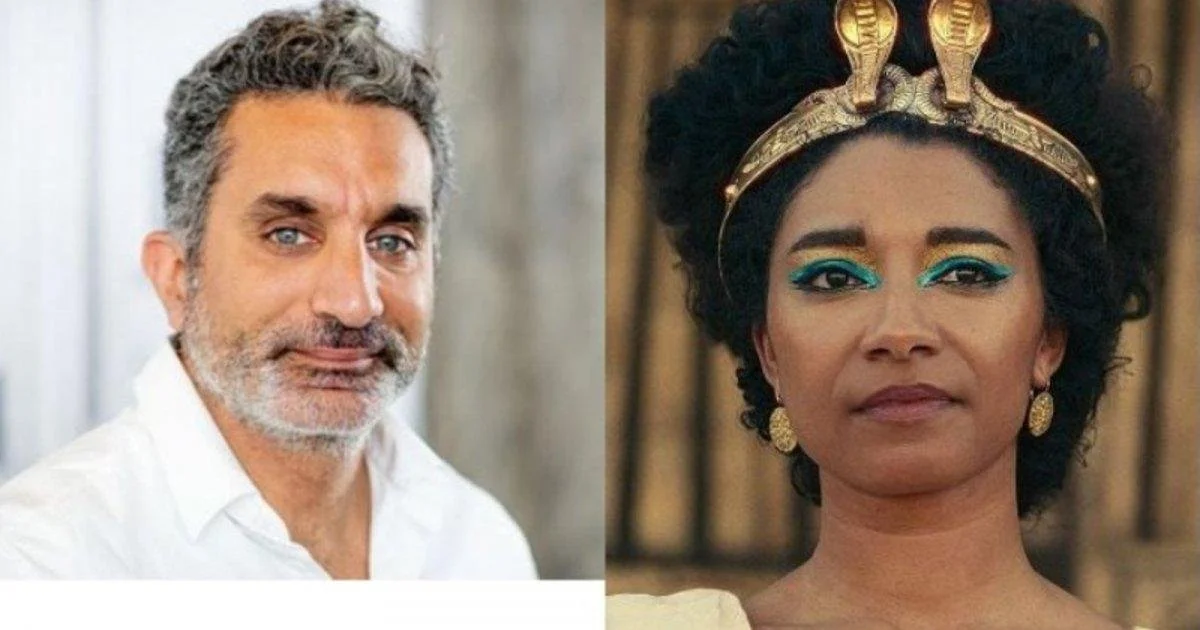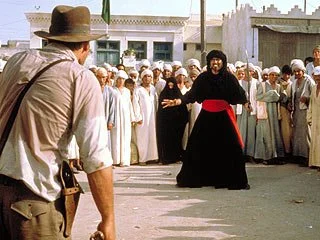Arabs & Hollywood: A shitty relationship
Guess what folks? Another day, another Hollywood casting controversy. This time, it's Adele James, a non-Egyptian actress, strutting onto the scene to play Cleopatra in a Netflix show. Oh boy, can you hear the sound of keyboards clicking in fury? Egyptian comedian Bassem Youssef certainly did. They aired his thoughts on Piers Morgan Uncensored, calling out Netflix and Hollywood for their fabulous double act of hypocrisy and cultural theft. Let's unpack this rollercoaster of a debate, shall we?
Bassem Youssef (left) and Adele James (right) cast as Cleopatra
Cultural Appropriation
According to the Oxford English Dictionary, cultural appropriation is "the unacknowledged or inappropriate adoption of customs, practices, ideas, etc. of one people or society by another." In the case of the Cleopatra casting, it seems Netflix decided to try on Egyptian culture like a new pair of shoes. Because, you know, it’s not like they’ve got actual Egyptians who could have played the part. Youssef argues Netflix is guilty of cultural appropriation by casting a black woman to play Cleopatra when she was, in fact, not black. But hey, who cares about historical accuracy when you've got ratings to think about, right?
Blackwashing
Blackwashing, as if you didn't know, is the flip side of the infamous "whitewashing" coin. It's where non-black roles are filled by black actors. Now, don't get me wrong, diversity and representation are crucial in cinema. But Hollywood, in its typical 'bigger is better' fashion, doesn't just subtly slide into inclusivity. No, no, no. They dive headfirst, often bypassing historical accuracy and cultural context.
Take the recent casting of Adele James as Cleopatra in a Netflix series. Now, Cleopatra, the last active ruler of the Ptolemaic Kingdom of Egypt, was of Macedonian Greek descent, with possible Egyptian lineage. She was not, as the casting of Adele James might suggest, a black African. This is not a game of 'Guess Who?' or a pick-your-own-adventure novel. This is history, dear Hollywood.
The problem here isn't about black actors landing roles – far from it. The issue lies in the disregard for historical accuracy and cultural authenticity in favor of performative diversity. It's like Hollywood wants a gold star for being inclusive, but doesn't want to put in the legwork. So, they slap a veneer of diversity on their productions and call it a day.
A screenshot from the series' trailer shows a scene from "Queen Cleopatra." - Netflix
More surprises (Or not really)
It's like a game of bingo where the squares are all different ethnicities and historical figures, and you never know who's going to pop up where. Our latest surprise? Israeli actress Gal Gadot, best known for her role as Wonder Woman, is set to play Cleopatra in an upcoming film. Yes, you heard that right. The Last Queen of Egypt, played by Wonder Woman. Cue the collective global eyebrow raise.
Marble bust of Cleopatra VI of Egypt from 30-40 BC
Now, Gal Gadot’s performances in the DC Universe have been well-received. But Cleopatra? Let's unpack the issues here.
Firstly, there's the issue of ethnicity. Again, Cleopatra VII Philopator was the last active ruler of the Ptolemaic Kingdom of Egypt, and while her exact ancestry is a matter of some debate, most agree that she was of Greek Macedonian descent, with a possible splash of Egyptian. Gadot, on the other hand, is Israeli, of Ashkenazi Jewish descent. Not exactly a match made in casting heaven.
Next, we have the question of representation. Hollywood has a long and problematic history when it comes to the portrayal of Arab and North African characters, often casting white actors in these roles, which is part of a broader issue known as whitewashing. Casting an Israeli actress as an Egyptian queen is a missed opportunity to cast an Arab or North African actress in the role, further contributing to the erasure and marginalization of these groups in Hollywood.
And then there's the politics. Given the ongoing tensions and conflicts between Israel, Palestine and its neighboring Arab countries, casting an Israeli actress as an iconic Egyptian figure is bound to ruffle a few feathers. It's a controversial choice that has sparked debates about cultural appropriation and political sensitivities.
Lastly, there's the issue of authenticity. One of the key criticisms of Hollywood is its frequent distortion of history and cultures. By casting Gadot as Cleopatra, the film risks perpetuating stereotypes and misconceptions about Egyptian culture and history. This undermines the importance of authenticity in storytelling, particularly when dealing with such significant historical figures.
Movie cover for Cleopatra, played by Gal Gadot (2023)
So, while we wait for the next round of Hollywood historical bingo, one thing is clear: the debate over Gal Gadot's casting as Cleopatra shows that Hollywood still has a long way to go when it comes to representation, authenticity, and cultural sensitivity.
Maybe one day, Hollywood will figure out that casting should respect both diversity and authenticity. Until then, we'll just have to sit back and watch as they continue to rewrite history, one role at a time. Stay tuned for the next episode of 'Who's playing whom this time?' in the grand theatre of Hollywood!
Arab Misrepresentation: From Terrorists to Pharaohs
And let's not forget the grand old tradition of misrepresentation. If you've seen an Arab character in a Hollywood movie, chances are they were a terrorist, a rich oil baron, or an exotic beauty waiting to be saved by a white hero. Because who needs character depth and nuance when you've got stereotypes, right?
For example, the 1994 film "True Lies" depicts Arab terrorists as ruthless, violent extremists, reinforcing the false belief that terrorism is an inherent part of Arab culture. Similarly, the portrayal of Princess Jasmine in Disney's "Aladdin" (1992) objectifies and exoticizes Arab women, perpetuating harmful Orientalist fantasies (Said, 1978). As Lila Abu-Lughod, a professor of anthropology and women's studies, points out, these portrayals "reinforce a sense of cultural superiority among Western audiences while dehumanizing and marginalizing Arabs" (Abu-Lughod, 2006).
Arab in Indiana Jones: Raiders of the Lost Ark (1981)
Change: Because the Status Quo is Getting Old
If you're tired of the same old Hollywood song and dance, there are a few things you can do. Some suggestions include:
Supporting Arab filmmakers and actors: Audiences can vote with their wallets by supporting films that portray Arabs in an authentic and nuanced manner. By showing that there is a demand for these stories, studios may be more inclined to invest in them.
Advocacy and education: Film festivals, academic institutions, and advocacy groups can play a vital role in promoting and supporting Arab cinema. By showcasing Arab films and fostering discussion around the issues of representation, these organizations can help raise awareness and encourage change.
Developing diverse talent: Film schools and industry organizations should work to create opportunities for Arab filmmakers, actors, and writers to hone their skills and gain experience in the industry. This will help ensure that there is a pipeline of diverse talent to tell these important stories.
Conclusion
So there you have it. The casting of Adele James, and Gal Gadot, as Cleopatra is just another symptom of the larger disease plaguing Hollywood. The cure? A healthy dose of cultural respect, accurate representation, and the courage to break from tired, problematic traditions. But let's not hold our breath. After all, this is the same industry that thought Jake Gyllenhaal could pass as the Prince of Persia.
The Cleopatra controversy is a stark reminder of Hollywood's ongoing struggle with representation. And while it's easy to poke fun at the industry's missteps (and believe me, it's very easy), we need to remember that this is a systemic issue that needs a systemic solution. It's not enough to put a band-aid on a bullet wound and call it a day. We need to dig deep, challenge the status quo, and demand more from our storytellers.
So here's to the future. A future where Bassem Youssef doesn't have to defend his culture on national television. A future where Arab actors are given the same opportunities as their non-Arab counterparts. It's a tall order, but I believe we're up to the challenge. In fact, my husband and I are taking on that very challenge, telling our own stories and changing the narrative with everything we do. So if you made it until here, thank you for reading. You’ll be seeing more of our stories and soon, our own movies that will highlight Arab culture the most authentic way.
Interested in learning Lebanese Arabic? Unlock the vibrant world of Lebanese culture by signing up for our engaging online Lebanese Arabic lessons today!
Sources:
Cleopatra was light-skinned, Egypt tells Netflix in row over drama (2023) The Guardian. Retrieved from https://www.theguardian.com/tv-and-radio/2023/apr/28/cleopatra-was-light-skinned-egypt-tells-netflix-in-row-over-drama
Abu-Lughod, L. (2006). Dramas of Nationhood: The Politics of Television in Egypt. University of Chicago Press.
Alsultany, E. (2012). Arabs and Muslims in the Media: Race and Representation after 9/11. New York University Press.
Gay, R. (2015). White Actors Playing People of Color: A Long and Troubling History. The New Republic. Retrieved from https://newrepublic.com/article/123308/white-actors-playing-people-color-long-troubling-history
Jones, P. (2008). Cleopatra: A Sourcebook. University of Oklahoma Press.
Said, E. W. (1978). Orientalism. Vintage Books.
Malek, R. (2019). Oscars 2019: Rami Malek's acceptance speech for Best Actor. Retrieved from https://www.youtube.com/watch?v=0pdqf4P9MB8
Shaheen, J. G. (2001). Reel Bad Arabs: How Hollywood Vilifies a People. Olive Branch Press.






